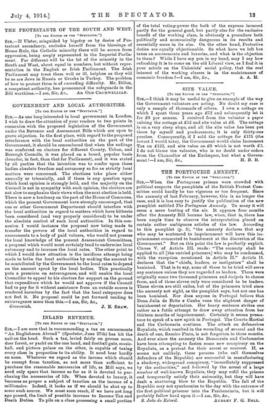GOVERNMENT AND LOCAL AUTHORITIES.
[To THE EDITOR OF THE "SrECTATOR..] SIR,—As one long interested in local government in London, I wish to draw the attention of your readers to two points in connexion with the proposed legislation of the Government under the Revenue and Assessment Bills which are open to grave objection. In the first place, with regard to the proposed interference with the local authorities on the part of the Government, it should be remembered that when the suffrage was conferred on electors for different County, Urban, and Borough Councils, it was placed on a broad, popular basis (broader, in fact, than that for Parliament), and it was stated by all parties that the intention was to confer upon these bodies absolute freedom and autonomy so far as strictly local matters were concerned. The elections take place either annually or triennially, and if there is any question upon which local opinion is strongly held, and the majority on the Council is not in sympathy with such opinion, the electors are not slow to emphasize their views when the next election is held. There is now a tendency on the part of the House of Commons, which the present Government have strongly encouraged, that one or other Government Department should interfere with the local authorities in regard to matters which have hitherto been considered (and very properly considered) to be under the absolute control of such local authorities. In this con- nexion I would instance the proposal now being made to transfer the powers of the local authorities in regard to assessments to a body of paid valuers, who would not possess the local knowledge of the present Assessment Committees, a proposal which would most certainly tend to undermine local autonomy and to increase the local rates. The other point to which I would draw attention is the insidious attempt being made to bribe the local authorities by making the amount to be contributed by the Government to the local rates to depend on the amount spent by the local bodies. This practically puts a premium on extravagance, and will enable the local Councillor to appeal to his electors for support on the ground that expenditure which he would not approve if the Council had to pay for it without assistance from an outside source is rendered harmless by the fact that the local ratepayer does not feel it. No proposal could be put forward tending to extravagance more than this.—I am, Sir, &c.,


















































 Previous page
Previous page